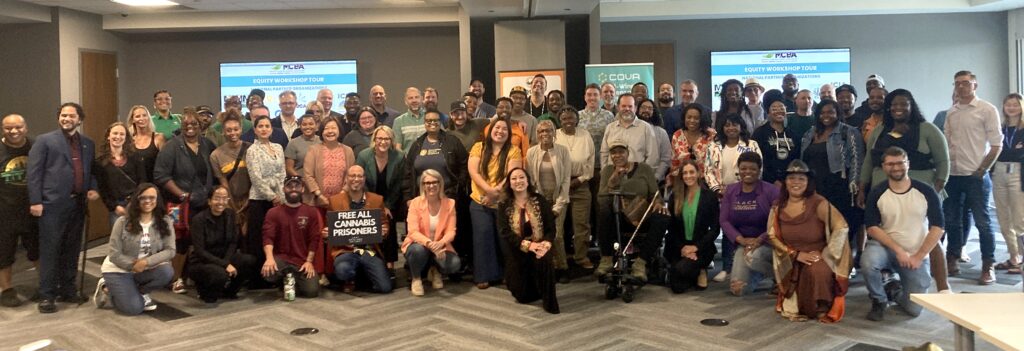As America moves rapidly towards the end of federal cannabis prohibition, last month’s re-introduction of the MORE Act offers an approach to legalization that prioritizes social, racial, and economic justice. It’s a welcomed start that needs adjustment to achieve true equity, and a recently released report helmed by Cannabis Regulators of Color Coalition (CRCC) vice chair Shaleen Title provides numerous pathways for ensuring that federal cannabis legalization supports small and minority-owned businesses through equitable regulation.
The Parabola Center proposes MORE Act amendments for equitable regulation of a federally legal cannabis industry
Published by the Parabola Center for Law and Policy, an independent group founded by Title, the report’s proposed amendments address the state-level trend of favoring large, white-owned corporations with easy access to capital, offering guidance on how the federal government can sidestep creating oligopolies in the emerging industry.
“CRCC applauds Parabola Center for synthesizing insights from our collective experience as government leaders overseeing equity-focused programs at the state and local level into tangible recommendations to improve upon the MORE Act,” said CRCC founding chair Dasheeda Dawson. “A successful framework for federal legalization is one that supports and strengthens the progress we’ve made thus far in creating equitable opportunities for communities and individuals that have experienced disproportionate harm under cannabis prohibition.”
At the heart of the Parabola Center’s recommendations is a call for an incremental opening of a national cannabis marketplace, which also include priority licensing and easier access to capital for small and minority-owned companies.
Interstate Cannabis Trade
“We need to implement those measures before we throw open the doors to interstate cannabis trade,” said Dawson. “If we don’t, by the time small businesses are up and running, massive multinational companies will already control the market.”
“The process of opening interstate cannabis trade needs to be done thoughtfully and deliberately in order to prevent Big Tobacco and other profit-driven companies from dominating the market,” said CRCC Vice-Chair Shaleen Title, a former Massachusetts state cannabis commissioner. “To do that, we need to avoid opening the floodgates to interstate commerce all at once.”
Alternatives recommended by the Parabola Center include allowing regional trade compacts, for example on the West Coast or in New England, where many individual states already have mature state markets. The effects of limited interstate trade in those markets could be studied as pilot projects, and lessons learned would inform the creation of a nationwide marketplace.
And moreover I'm not sure people are really understanding the immediate corporate free-for-all poised to take place with descheduling, that would make current Big Weed look like teddy bears. The same sinking feeling I had when I realized what HCAs were going to do were in MA.
— Shaleen Title (@shaleentitle) June 18, 2021
Another option entails initially allowing only social equity businesses—those owned by individuals or members of communities that experienced disproportionate harm from cannabis prohibition—to engage in interstate commerce. Many CRCC members have advocated for that approach as a way to build a robust, equitable industry.
“CRCC supports ending the federal war on cannabis, but it’s crucial we replace it with a system that’s fair and equitable,” said Title. “Handing control of a multibillion-dollar industry to major corporations and industries like Big Alcohol and Big Tobacco puts profit over people—especially when we know that many have records of advertising to children and lying about product safety.”
Cannabis Regulators of Color Coalition
The Cannabis Regulators of Color Coalition (CRCC) is a coalition of government officials appointed and/or selected to lead, manage and oversee the regulatory and policy implementation for legal cannabis markets across the United States and abroad. As the leading architects of cannabis equity and policy reform in the United States, its mission is to be a source of guidance and education for legislators and government agencies that aim to build sustainable cannabis regulatory frameworks that are also designed to deliver on the reparative and restorative potential of the global cannabis legalization and decriminalization movement.





